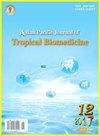Barrientosiimonas humi ethyl acetate extract exerts cytotoxicity against MCF-7 and MDA-MB-231 cells via induction of apoptosis and cell cycle arrest
IF 1.7
4区 医学
Q3 TROPICAL MEDICINE
引用次数: 2
Abstract
Objective: To elucidate the cytotoxic effect of the secondary metabolites of Barrientosiimonas humi (B. humi) on MCF-7 and MDA-MB-231 human breast cancer cells and its underlying mechanisms of action. Methods: The extract was obtained from the fermentation of B. humi and fractionation of the crude extract was conducted via column chromatography. Cytotoxicity of the B. humi extract was determined by using MTT assay and real-time cellular analysis. Morphological changes, cell cycle profiles, mode of cell death, and caspase expressions of control and treated breast cancer cells were determined. Results: The ethyl acetate extract isolated from B. humi was cytotoxic against MCF-7 and MDA-MB-231 cell lines. One of the dichloromethane (DCM) fractions, designated as DCM-F2, exhibited the strongest activity among all the fractions and thereby was selected for further studies. DCM-F2 had selective cytotoxicity on target cells by inducing apoptosis, particularly in the early stage, and cell cycle arrest. Treated cells caused inhibition of cell cycle progression at 72 h leading to a significant increase (P < 0.05) in the G0/G1 population. DCM-F2 treated MDA-MB-231 cells showed caspase-dependent apoptosis, whereas DCM-F2 treated MCF-7 cells showed a caspase-independent apoptosis pathway. Five compounds were successfully isolated from B. humi. Cyclo (Pro-Tyr) was the most cytotoxic and selective compound against MCF-7 cells. Conclusions: B. humi ethyl acetate extract exhibits significant cytotoxicity against MCF-7 and MDA-MB-231 cells via induction of apoptosis and cell cycle arrest.大白菜乙酸乙酯提取物通过诱导细胞凋亡和细胞周期停滞对MCF-7和MDA-MB-231细胞产生细胞毒性
目的:探讨胡氏疟原虫(B.humi)次级代谢产物对MCF-7和MDA-MB-231人乳腺癌症细胞的细胞毒性作用及其作用机制。方法:从胡米发酵中提取粗提物,用柱色谱法对粗提物进行分级。采用MTT法和实时细胞分析法测定胡米提取物的细胞毒性。测定对照和治疗的乳腺癌症细胞的形态学变化、细胞周期特征、细胞死亡模式和胱天蛋白酶表达。结果:胡米乙酸乙酯提取物对MCF-7和MDA-MB-231细胞具有细胞毒性。二氯甲烷(DCM)级分之一,命名为DCM-F2,在所有级分中表现出最强的活性,因此被选择用于进一步研究。DCM-F2通过诱导细胞凋亡(特别是在早期)和细胞周期停滞对靶细胞具有选择性细胞毒性。处理的细胞在72小时引起细胞周期进程的抑制,导致G0/G1群体的显著增加(P<0.05)。DCM-F2处理的MDA-MB-231细胞显示出胱天蛋白酶依赖性凋亡,而DCM-F2治疗的MCF-7细胞显示出不依赖胱天蛋白酶的凋亡途径。从B.humi中成功分离出5个化合物。Cyclo(Pro-Tyr)是对MCF-7细胞最具细胞毒性和选择性的化合物。结论:胡米乙酸乙酯提取物通过诱导细胞凋亡和细胞周期阻滞,对MCF-7和MDA-MB-231细胞具有显著的细胞毒性。
本文章由计算机程序翻译,如有差异,请以英文原文为准。
求助全文
约1分钟内获得全文
求助全文
来源期刊

Asian Pacific journal of tropical biomedicine
Biochemistry, Genetics and Molecular Biology-Biochemistry, Genetics and Molecular Biology (miscellaneous)
CiteScore
3.10
自引率
11.80%
发文量
2056
审稿时长
4 weeks
期刊介绍:
The journal will cover technical and clinical studies related to health, ethical and social issues in field of biology, bacteriology, biochemistry, biotechnology, cell biology, environmental biology, microbiology, medical microbiology, pharmacology, physiology, pathology, immunology, virology, toxicology, epidemiology, vaccinology, hematology, histopathology, cytology, genetics and tropical agriculture. Articles with clinical interest and implications will be given preference.
 求助内容:
求助内容: 应助结果提醒方式:
应助结果提醒方式:


